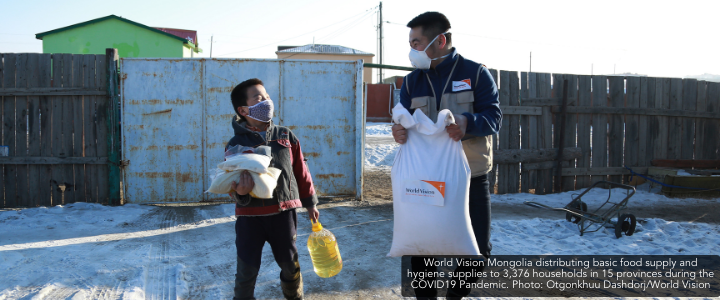
International Volunteer Day 2021: a scan of development and diplomatic perspectives
COVID has seen many people struggling to put food on the table, losing jobs, suffering ill health, and feeling isolated. The stories that have warmed our hearts have been those such as members of the Sikh community delivering free meals through Turbans 4 Australia, and people packing hampers at community centres. In 2020-21, an estimated $16.2 million was spent on the international developed-focused Australian volunteers’ program. This included volunteers in COVID essential roles, remote volunteering, piloting new approaches, supporting local volunteering, and raising awareness of the program though story telling. And yet in other spaces the pandemic has ‘decimated volunteering’.
December 5 is International Volunteer Day. The day was designated by the United Nations in 1985 and provides an opportunity for volunteers and organisations to celebrate their efforts and promote their work among communities, non-governmental organisations, UN agencies, government, and the private sector.
Models of volunteering programs are changing. Red Cross conducted an evaluation of its volunteers program in 2019. It found supporting locally-led humanitarian action was a key part of the program in terms of delivery, the peer-to-peer nature of many assignments, and national societies owning the process. The report found the program was aligned to localisation principles. Former volunteers such as David Lambourne have also identified the need for locally-led agenda and pace setting:
Prior to volunteering in Kiribati, I had not really considered a future for myself in international development. I had thought that I would serve my 2 years, then return to Australia and pick up where I had left off. How wrong I was! Kiribati became my forever home, with stints working in Nauru and Bougainville. Volunteering provided the bedrock for my later contributions – the opportunity to live and work at the grassroots instilled in me a deep appreciation for the importance of first engendering trust and establishing bona fides before attempting to offer assistance. It might seem like common sense but, in my later work, I saw far too many international advisers blow in, dispense their words of wisdom, and then blow out again, having checked off their list of deliverables without a care for what (if any) impact their visit might have. Genuinely sustainable development is hard work and requires an investment of time that too few seem willing to make. We need to slow down, build relationships of trust with those we are trying to assist, and truly empower them. Change must be allowed to occur at their pace, not ours. We are never as important as we think we are, and there is always time to laugh. This is what volunteering has taught me.
Volunteering has also been described as integral to immigrant integration, with women who have recently arrived from Afghanistan being among those volunteering at Food Hubs in Australia. Recent findings indicate time since migration, social networks, and organisational membership are identified as the major factors driving immigrant volunteering. Indeed, there is historical precedent to the positive effects of volunteering on refugee integration, as in the case of the Kindertransport effort of 1938-39, which brought child refugees of Jewish origin escaping from Nazi-occupied Europe to the UK on the cusp of the Second World War. In what was an unusually successful experience of integration, Kindertransport refugees were found to be actively engaged in volunteering and advocacy efforts at different points throughout their lives. Volunteering was identified as one of the key domains of activity that led to their robust integration in British society.
Research has also revealed the role for volunteering in development and diplomacy. Actors in Australia’s international development and humanitarian space who began their careers as volunteers in different parts of the world, consider their volunteering experiences as formative to their impact on policy and practice. Interviews reveal a start in volunteering has been a precursor to some exciting and dynamic career paths. Their volunteering stints appear to have exposed them to unfamiliar contexts and inculcated an appreciation for different cultures and developed cross-cultural skills:
For me volunteering was a way of being productive, while wanting to take stock of the direction my life was heading. To me it was my way of opening up my options so I could see more clearly who I wanted to be, what I wanted to do and how I wanted to live. It was useful like that. The second time I volunteered was more strategic still – I wanted it to turn into a development job. I knew I wanted to be recognised as someone with cross-cultural skills and volunteering was an entry point to me to create that. These are my personal motivations for volunteering; should I volunteer again in the future (and I hope I will) then I think I will have a different motivation again. Perhaps more about passing on my knowledge or experience, or simply helping people do things better or differently (former volunteer Ross Craven).
Another interviewee who wishes to remain anonymous confirmed that her volunteer role made her ‘much more effective ‘in her subsequent DFAT role. ‘The sink or swim aspect made me much more aware of my own resilience and more willing to dive into new challenges later in my career’. Placements have been identified as distinct learning environments with impact over a long period on careers and understanding. For example, an experienced DFAT diplomat interviewed found through her volunteering role she ‘left having learned more about myself – through my colleagues, friends, through a place that is as far from anywhere as I’ve ever been, but on the front lines of some of the major challenges the world is facing’. Similarly, senior development practitioner Lee Brentnall when interviewed recently said:
For me, volunteering as a skilled volunteer provided me with much deeper understanding of the many factors influencing government decisions in country, a more nuanced understanding of the local culture and as a volunteer, there was a different level of acceptance by local communities that is extra special and unforgettable. I’m so grateful to have started my international development work as a volunteer. It gave me very practical insights into all levels of development, from community, grass roots to high level government policy decisions. The experiences I had volunteering, no doubt have shaped my development approach throughout my career.
There are some great resources available covering volunteers in development practice. The ACFID code of conduct extends to volunteers. The National Standards for Volunteer Involvementprovides a framework and benchmarks as does the Quality Principle 9 People and Culture. The most recent example is the Global Volunteering Standard which was released in October 2021. It aims to help organisations gain a better understanding of good practice in volunteering for development. The Standard acts as a starting point for organisations to assess their own practice and make changes that will help them be more responsible and impactful in their practice. Tools provided to guide work include a Self-Assessment Tool which covers designing and delivering programs, duty of care, volunteer management, measuring impact and a learning library of good practice.
UN Secretary General Antonio Guterres in the lead up to this Volunteer Day, is appealing for the promotion and support of volunteering, and recognition of the contribution of volunteers towards the Sustainable Development Goals. Make sure you take time to celebrate volunteers on 5 December

Dr Jane Alver & Ujjwal Krishna
Jane Alver is the Director of Effectiveness and Engagement at the Australian Council of International Development. She holds a PhD in political science with a research focus on gender, the Pacific region and civil society.
Ujjwal Krishna is a PhD candidate at the Institute for Human Security and Social Change, La Trobe University. His research with the DFAT-funded Developmental Leadership Program focuses on the politics of development policy.








